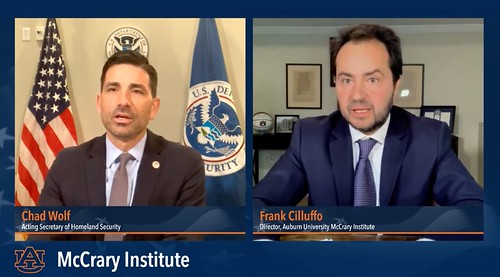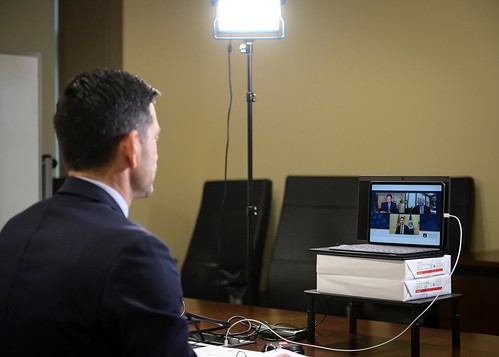Homeland Security acting secretary discusses focus on economic security and COVID-19 during virtual event hosted by Auburn University
Article body
Amid the ongoing COVID-19 pandemic, the U.S. Department of Homeland Security is safeguarding the nation in many ways – to include a priority focus in the months ahead on economic security.
“Economic security is really homeland security,” said Homeland Security Acting Secretary Chad Wolf in a virtual live event hosted Thursday by Auburn University’s McCrary Institute for Cyber and Critical Infrastructure Security.
Wolf said that, in addition to its newfound role of fighting COVID-19, his department has taken a stronger position on its role dealing with economic security. Wolf noted that whether it’s imports, exports, airports or seaports, it all weaves together homeland and economic security.
In response, the department created the Office of Economic Security to provide recommendations on best practices and policies. With 90 percent of everyday consumer goods coming through ports, Wolf said it’s imperative for his department to take a stronger role on the economic side.
“I think what we’ve seen here, really highlighted by COVID-19, is really that the supply chain and how it’s under an immense amount of pressure and even the small little hiccup has really a trickle effect and big effect I would say across the board,” he added.
During the 45-minute virtual event Thursday, Wolf addressed COVID-19 and other issues of core concern and responsibility, to include the department’s role in responding to natural disasters and fighting cyber terrorism. Wolf said the department has had three priorities during the current pandemic: respond, recover and restore. This involves all agencies working together to address the current issues, plan for the short term and be prepared for the long term, he said.
The department has been particularly focused on restoring trade, travel and commerce to the American economy and ensuring the supply chain, particularly for personal protective equipment, or PPE, is protected and prepared. This includes the formation of a supply chain task force, accelerating the timeframe of PPE delivery from Asia to the United States and building up the capabilities to produce more domestically.
“We’re restocking the national stockpile,” Wolf said, “and figuring out how do we preserve what we have here today.”
Thursday’s event was moderated by Auburn University McCrary Institute Director Frank Cilluffo, who said that the “breadth and the depth (of Homeland Security) is incredible. The Department of Homeland Security has to be open 24/7, regardless of the crisis.”
While COVID-19 has been ever present in the minds of the nation, so, too, is the threat of natural disasters, especially in Alabama. Wolf made an analogy to what his department and its agencies, such as FEMA, are dealing with when considering the current pandemic is on top of their other normal responsibilities.
“It’s like a hurricane; some states are dealing with a category 5, some are dealing with a category 3,” Wolf said.
To prepare for the current tornado season and the impending hurricane season, the department is building a mirror National Response Coordination Center site and taking a portion of the FEMA workforce to work on tornado and hurricane activity.
The pandemic has also forced the department to be creative in the way it would normally assess and respond to natural disasters by using more virtual capabilities, such as satellites and drones, and placing displaced individuals from tornado-damaged areas in local hotels instead of shelters since many hotel capacities are far below normal.
“Like anything else, COVID is changing how the department works,” Wolf said.
Lastly, Wolf addressed the need of the private and public sectors to come together like they have during the recent pandemic. There is much work ahead, but he said the state of Alabama is a great example of how that can happen.
“The department has a number of resources in the state of Alabama, both from a FEMA standpoint and cybersecurity standpoint, and we find great partnerships, not only with the private institutions in the state, but also with Gov. Ivey. The state of Alabama has been a great partner to the Department of Homeland Security over the years,” Wolf said. “I really appreciate the work of Auburn University and the McCrary Institute. The partnership has been great, and I look forward to continuing this conversation.”
Auburn University and the McCrary Institute have hosted a number of high-ranking officials on campus in the past year—including TSA Administrator David Pekoske, CISA Director Chris Krebs, CISA Assistant Director Brian Harrell—as a result of the partnership with Homeland Security. The institute also hosted CIA Director Gina Haspel and FBI Deputy Director David Bowdich.
The McCrary Institute is focused on practical, interdisciplinary research and innovation in infrastructure and cybersecurity. Founded through a gift from the Alabama Power Foundation in 2014, the institute is tasked with developing next-generation technologies aimed at improving the security and operation of the nation’s infrastructure.
Related Media
Media interested in this story can contact Communications Director Preston Sparks at (334) 844-9999 or preston.sparks@auburn.edu.
Auburn University is a nationally ranked land grant institution recognized for its commitment to world-class scholarship, interdisciplinary research with an elite, top-tier Carnegie R1 classification, life-changing outreach with Carnegie’s Community Engagement designation and an undergraduate education experience second to none. Auburn is home to more than 30,000 students, and its faculty and research partners collaborate to develop and deliver meaningful scholarship, science and technology-based advancements that meet pressing regional, national and global needs. Auburn’s commitment to active student engagement, professional success and public/private partnership drives a growing reputation for outreach and extension that delivers broad economic, health and societal impact.






